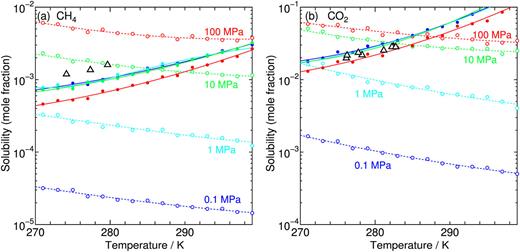On the phase behaviors of CH4–CO2 binary clathrate hydrates`:` Equilibrium with aqueous phase

A new paper from our research group has been published.
We explore the solubilities of guest CH4 and/or CO2 in the aqueous state coexisting with the corresponding hydrate. The equilibrium conditions are estimated by calculating the chemical potentials of water and guest species in the hydrate on the basis of a statistical mechanical theory using pairwise intermolecular potentials. This requires the least computational cost while covering a wide range of temperature, pressure, and composition of guest species, even for the binary hydrate. The nonstoichiometric nature, one of the most important characters of hydrates, is invariably taken into account when evaluating its phase behaviors and the driving force for nucleation of hydrates. The two-phase equilibrium concerning CO2 hydrate is evaluated considering a low but finite value of CO2 solubility in water. It is found that the finite solubility gives rise to a small systematic deviation of the dissociation temperature of CO2 hydrate. The solubility of CO2 coexisting with fluid CO2 decreases with temperature but the opposite temperature dependence is obtained in the presence of hydrate, as in the case of CH4. This method is applied to CH4–CO2 binary hydrates of various guest compositions. We also find a significant difference in composition of guests among the phases involved in the equilibria.
Hideki Tanaka, Masakazu Matsumoto, Takuma Yagasaki; On the phase behaviors of CH4–CO2 binary clathrate hydrates: Equilibrium with aqueous phase; J. Chem. Phys. 161, 214503 (2024). https://doi.org/10.1063/5.0244386
